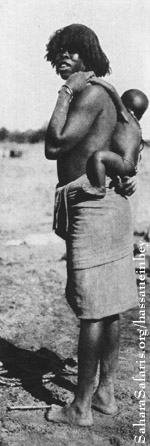LAST STAGES OF THE JOURNEY
The march from Ouenat to Erdi, on the French
Equatorial Africa frontier, was one of the most difficult experiences of
the entire six months of travel. It required long treks over very
difficult rocky country.
The caravan was now piloted by an old man of the
Goran tribe. He was nearly 65 years of age, was lame, and had not been
over that portion of the desert for seven years; but he would trek 12
hours or more each night, and in the morning would still have the most
benign expression imaginable.
He was a wonderful son of the desert, and without
his help I do not think I could have completed the last leg of the
journey. Yet on more than one occasion he faltered and his "God knows
best" (see page 249) was said with quavering uncertainty.
Some of our camels dropped by the wayside and had
to be destroyed, while my men were constantly falling out of line to
catch a half hour's sleep, then rejoining the caravan at accelerated
pace.
Our water ran low and there was more than one night
when I thought that the desert would reclaim its secret of the hidden
oases by blotting out our little party and swallowing us in the sands.
Happily, we came through, and on the morning of the
eleventh day we descended into the valley of Erdi, with its trees, its
welcome grass, and its water.
We had still far to go to get in touch with
civilization again, but the treks between wells and villages were
comparatively short and devoid of unusual hardships, while the natives
were no longer unfriendly.
Our receptions at El Fasher and at El Obeid were
such as to gladden the heart of him who has wandered into far places and
has returned home with the objectives of his journey luckily
accomplished.
(p277)

AN
UNCOMFORTABLE PERCH FOR THE INFANT
The mother is a Zaghawa girl whose
features are much coarser than those of her desert sister, the Bidiat
woman shown on page 275. [photo page 277]
|
